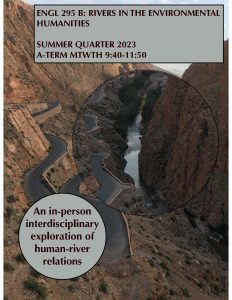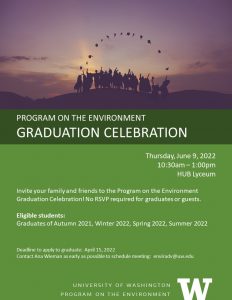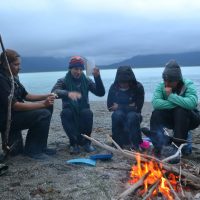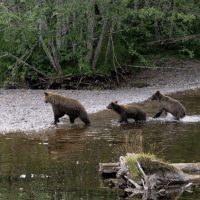The Program on the Environment will host the Autumn 2021 Capstone Symposium on Wednesday, December 1, online. All are welcome to attend and support students as they present on the culmination of their hard work over three quarters.
The Capstone Course Series is a highlight for many students, and serves to catapult some into their first jobs or even their dream careers. Through internships, research, and social media training, students come out of the experience well equipped to communicate about the problem they sought to solve, and to tie their academic learning with specific research questions.
This event is open to the public, and we encourage students interested in learning about the Capstone, as well as members of the community, to join us. Please also follow the event on Twitter #POEcap.
**Event program can be found here: PDF. Video presentations can be found here: Playlist
**Abstracts and additional information about each project can be found in here: Word/PDF
Autumn 2021 Symposium Schedule
Wednesday December 1
4:30 PM – 4:40 PM Welcome & Session Overview
4:40 PM – 4:50 PM Session A Speaker Intros
4:50 PM – 5:50 PM Poster Session A – Education, Outreach & Engagement; Natural Science & Restoration; Equity & Justice
Katarina Crkonova (Room #1) – What Goes Around, Comes Around: Educating Children on the Composting Cycle. Site Partner: Cedar Grove (Summary) (Poster PDF) (Video)
Divinity Dodge (Room #2) – Aquatic Communication in the Willamette River Basin: A Case Study of Federal Environmental Outreach. Site Partner: National Oceanic and Atmospheric Administration Restoration Center (Summary) (Poster PDF) (Video)
Connor Flynn (Room #3) – The Sound of Change: How Can Podcasts Be Used to Inspire Environmental Action? Site Partner: University of Washington Bothell and Cascadia College (Summary) (Poster PDF) (Video)
Jessie Gilbert (Room #4) – How City Parks Can Improve Well Being and Promote Sustainable Actions. Site Partner: Friends of Discovery Park (Summary) (Poster PDF) (Video)
Quinn Habedank (Room #5) – Sedimentology and Citizen Science: Ecological Monitoring In Carpenter Creek, Kingston, WA. Site Partner: Stillwaters Environmental Center (Summary) (Poster PDF) (Video)
Henri Hardman (Room #6) – King County’s Path to Net Zero: Building Energy Efficiency Upgrades. Site Partner: 2050 Project (Summary) (Poster PDF) (Video)
Julie Ira (Room #7) – Let’s Talk Trash: Implementing Sustainability in Higher Education. Site Partner: UW Recycling, Building Services Department, University of Washington (Summary) (Poster PDF) (Video)
Justine Jadallah (Room #8) – Environmental DNA: A Crab-Tivating Case Study of Science Communication. Site Partner: Washington Sea Grant
Isabella Koch (Room #9) – Foundation for the Future: Tools for Teaching Environmental Justice in Urban Environments. Site Partner: Seattle Global Shapers (Summary) (Poster PDF) (Video)
Ellie MacLean (Room #10) – Hidden Histories, Current Realities: Historical Context in Environmental Organizing. Site Partner: Seattle Neighborhood Greenways (Summary) (Poster PDF) (Video)
Sydney Porter (Room #11) – Fostering Community Knowledge Production as the Key to a Just and Sustainable Seattle. Site Partner: Sustainable Seattle (Summary) (Poster PDF) (Video)
Madison Weise (Room #12) – Vulnerability: Can We Define It Before It Is Too Late for Fish? Site Partner: National Oceanic and Atmospheric Administration, Alaska Fisheries Science Center (Summary) (Poster PDF) (Video)
Naeemah Zakarya (Room #13) – Climate Justice: The Role of Human Values in Effective Communication and Inspiring Action. Site Partner: Global Shapers Seattle Hub (Summary) (Poster PDF) (Video)
5:50 PM – 6:00 PM BREAK
6:00 PM – 6:05 PM Session Overview
6:05 PM – 6:15 PM Session B Speaker Intros
6:15 PM – 7:15 PM Poster Session B – Agriculture & Food Systems; Business & Sustainability; Policy & Regulation
Annabelle Acosta (Room #1) – Can’t Take the Heat? Create Defensible Space: Delivering Defensible Space to Wildfire Vulnerable Populations. Site Partner: Fire Adapted Methow Valley (Summary) (Poster PDF) (Video)
Matt Condrin (Room #2) – Awareness Is Key: Gauging the Awareness of Food Insecurity Issues. Site Partner: City Fruit (Summary) (Poster PDF) (Video)
Trish Deignan (Room #3) – Embracing the Power of Friendship: The Influence of Collaboration on Increasing Sustainability Engagement. Site Partner: UW Sustainability Office, University of Washington (Summary) (Poster PDF) (Video)
Sage Dewdney (Room #4) – Never Neutral: Subjectivity & Accountability in Environmental Reporting. Site Partner: The Northwest School (Summary) (Poster PDF) (Video)
Jonathan Frias (Room #5) – Waste Not Want Not, Assessing Best Food and Plastic Waste Prevention Approaches. Site Partner: Seattle Public Utilities (Summary) (Poster PDF) (Video)
Matt Goldman (Room #6) – Code Green: An Examination of the Resilience of Hospital Sustainability in Pandemic Times. Site Partner: Nalco Water, an Ecolab Company (Summary) (Poster PDF) (Video)
Mattijs Holler (Room #7) – Sustainable Construction: The Advantages and Disadvantages of Modern Construction Technologies. Site Partner: Herbert Bau GmbH (Summary) (Poster PDF) (Video)
Feiyang Ji (Room #8) – How College Campuses in North America Can Improve Sustainable Transportations. Site Partner: Common Caws for Sustainability, Cascadia College and University of Washington Bothell (Summary) (Poster PDF) (Video)
Hanna Maya Lester (Room #9) – Toilet Talk: How Replacing Toilets Can Increase Sustainability, Equity, and Quality of Life. Site Partner: Seattle Public Utilities (Summary) (Poster PDF) (Video)
Logan Pulsifer (Room #10) – Home Energy Use Matters; Residential Energy Disclosure in Seattle. Site Partner: King County Executive’s Office (Summary) (Poster PDF) (Video)
Madeleine Schroeder (Room #11) – How Re-Connecting With Nature Begins in the Backyard: What Motivates People to Engage in Small-Scale Ecological Design Projects. Site Partner: HomeGrown Organics (Summary) (Poster PDF) (Video)
Grace Zamzow (Room #12) – Corporate Sustainability: Unlocking the Potential of Carbon Offsets to Help Businesses Reach Carbon Neutrality. Site Partner: Puget Sound Beverage (Summary) (Poster PDF) (Video)
7:15 PM – 7:30 PM Closing
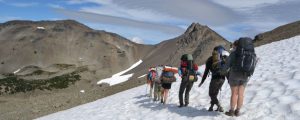 Spend 9 days (July 8 to 16) backpacking in Olympic National Park this Summer as part of the course, Wilderness in the Anthropocene (ENVIR 380)!
Spend 9 days (July 8 to 16) backpacking in Olympic National Park this Summer as part of the course, Wilderness in the Anthropocene (ENVIR 380)!